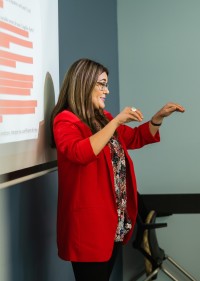CARS Influence on CAS Standards
NewsCARS’ Faculty and Student Research Lead to Change in Professional Standards
The Council for the Advancement of Standards in Higher Education (CAS), a consortium of professional associations in higher education, promotes the use of professional standards for the development, assessment, and improvement of student learning and programs. Comprised of over 40 professional associations representing over 115,000 professionals in higher education, CAS has developed 49 sets of standards and 3 cross-functional frameworks within diverse areas of the college student experience.
Dr. Sara Finney (Associate Director of the Center for Assessment and Research Studies; Professor in Graduate Psychology) was invited by the CAS governing board to review the current CAS standards (version 10) and provide feedback and updates. Based on Sara’s research over the past couple of decades, she helped CAS craft wording for two new standards: Program Theory and Implementation Fidelity. These new additions were added to the General Standards that apply to all functional areas on campus and are embedded in each individual set of CAS functional area standards. These General Standards are the foundation of the CAS Standards. CAS uses the words “must” in the General Standards to signify that these standards apply to institutions of all kinds (e.g., large, small, public, private) as well as remote and in-person educational settings. Hence, Program Theory and Implementation Fidelity are now expected aspects of program development, assessment, and improvement due to Sara’s contributions to Version 11 of the CAS Standards.
 “Two topics included in the 2022 General Standards revision are the use of program theory and implementation fidelity in various sections. Sara Finney and her colleagues have promoted the use of program theory and implementation fidelity (Smith et al., 2017) in higher education program design, implementation, and assessment. Program theory is “the construction of a plausible and sensible model of how a program is supposed to work” and it “clarifies the set of cause-and-effect relationships” connecting activities students engage in to the intended outcomes (Bickman, 1987, p. 5). While program theory undergirds program development and execution, implementation fidelity regards the extent to which the programs are implemented as designed (Dhillon et al., 2015). A program is most successful when all staff are familiar with the theory base(s) guiding its design and implementation.” (CAS Standards, 2023, p. 42)
“Two topics included in the 2022 General Standards revision are the use of program theory and implementation fidelity in various sections. Sara Finney and her colleagues have promoted the use of program theory and implementation fidelity (Smith et al., 2017) in higher education program design, implementation, and assessment. Program theory is “the construction of a plausible and sensible model of how a program is supposed to work” and it “clarifies the set of cause-and-effect relationships” connecting activities students engage in to the intended outcomes (Bickman, 1987, p. 5). While program theory undergirds program development and execution, implementation fidelity regards the extent to which the programs are implemented as designed (Dhillon et al., 2015). A program is most successful when all staff are familiar with the theory base(s) guiding its design and implementation.” (CAS Standards, 2023, p. 42)
Sara’s research on Program Theory and Implementation Fidelity with JMU PhD alumni Jerusha Gerstner, Andrea Pope, and Kristen Smith, in addition to collaboration with JMU colleagues Aaren Bare and Keston Fulcher made a practical change in how higher education programming will be designed, evaluated, and improved.

